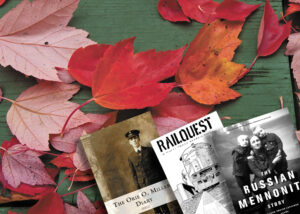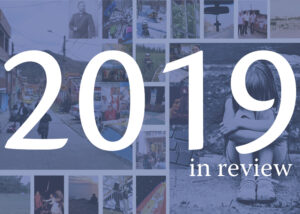Anabaptist Essentials ‘a quintessential travesty’
The following letter was abridged from one originally sent to Herald Press, the publisher of Palmer Becker’s Anabaptist Essentials.
I’m writing to express amazement that you would have published Anabaptist Essentials, when what it presents is highly simplistic and seriously uninformed.
Consider that there is no mention of the role in the 16th-century Anabaptist movement of Erasmus, the outstanding peace theologian of that century. Not to have even acknowledged Erasmus—or the English Reformers—in the section about “How did early Anabaptists come to this faith?” is inexcusable in a book that claims to give an overview of church history and answer that question accurately.
Abraham Friesen, in his book Erasmus, the Anabaptists and the Great Commission, stated: “It was indeed the impact of Christian humanism in general, and that of Desiderius Erasmus in particular—only partially mediated by Ulrich Zwingli—that gave rise to Anabaptism.” There you have it. Erasmus was the primary mediator and agent of the Christian peace tradition to first-generation Anabaptists.
Given such apparent woeful ignorance and caricature, one discovers that the rest of Becker’s book is also a quintessential travesty of “what makes Anabaptism unique” over against all other traditions, especially with the repeated juxtapositions of what “Many Christians emphasize” over against the obviously only valid what “Anabaptist Christians emphasize.” This is beyond naïve.
For those with any significant awareness of church history—of the incredible breadth, depth and beauty of the ancient roots/routes; of the classical tradition; and of multiple exemplary expressions the world over and throughout church history of faithfulness that Becker corrals as unique to Anabaptism—this book is not only sadly without merit, but it is deleterious to any kind of ecumenicity, peacemaking or spirit of “generous orthodoxy” one would hope for in today’s fragmented world.
—Wayne Northey, Agassiz B.C.
Low German is not a ‘dialect,’ but an original language
Re: “The quiet labours of a Low German translator,” Jan. 1, page 22.
There is a serious error and misunderstanding in Will Braun’s article, in which Low German is referred to as a dialect. It is, in fact, an original language, older by centuries and parent of High German. It was called Low (Plaut) because it was the language of the northern European seaboard with its low elevation. Low German was the language of the London office of the North Sea shipping company, the Hanse. Perhaps it was never a written language because of its many variations, of which Mennonite Plautdietsch is one. I’m grateful that the Mennonite variant is now reduced to writing, although spelling and the representation of the unique sounds of Low German are not yet agreed on.
Years ago I was able to donate my Low German New Testament to a friend who was working with Mennonites whose only language was Low German.
—Walter Klaassen, Saskatoon
Being ready means being in community
Re: “God with us with God,” Dec. 11, 2017.
For me, being ready for Christmas means being in community.
Let’s go back to the beginning. God spoke: “Let us make human beings in our image, make them reflecting our nature so they can be responsible for the fish of the seas, the birds in the air, the cattle, and, yes, the earth itself” (Genesis 1:26, The Message Bible).
To be ready is also to bring healing and hope. I have listened to many stories from people for whom Christmas is the worst time of the year. It makes me sad when people are judged by others who do not understand the cause of their actions or their inability to change. Many suffer from a variety of issues beyond their control: mental illness and poverty, to name two. We are all shaped by our individual history and have scars and are flawed. In Matthew 7:1, Jesus said: “Do not judge, or you too will be judged. For in the same way you judge others, you will be judged.”
Our vertical relationship with God through Jesus is connected to our relationship in the horizontal, all-inclusive body. In Matthew 25:34, Jesus said: “Truly I tell you, whatever you did for one of the least of these brothers and sisters of mine, you did for me.”
I long for the time when all refugees will find safety—like Mary, Joseph and Jesus did—when the lonely and excluded will find acceptance and inclusion at the banquet table, like those in Luke 14.
So, am I ready for Christmas? Maybe the question needs to be, “Are we ready?”
—Enos Kipfer, London, Ont.
How long will it take?
How many years will it be before most members of the Mennonite community accept LGBTQ people without reservation or bias? When will the preachy stop using Scripture to attack these people?
I recall as a teenager in the 1950s hearing adult conversation about remarried divorced people as “living in sin.” Many Mennonite churches refused to marry divorced people. They had to rely on a civil ceremony or another church for their marriage.
Princess Margaret and Lord Snowden couldn’t be married in the Church of England because Snowden was divorced. Now Prince Harry will be able to marry a divorcee in the Church of England this year.
The same has happened in our Mennonite community. Our pastors marry divorced people, who are warmly welcomed by our membership.
What needs to happen for LGBTQ people to receive a similar welcome from our Mennonite churches. Will we have to wait for the preachy objectors to die before a broad change in attitude happens? I pray that we will find leaders who will make this happen sooner rather than later.
—Herb Kornelsen, St. Catharines, Ont.
The author is a member of Grace Mennonite Church in St. Catharines.
Love without reservation or judgment
Re: “Honour God with Your Bodies” insert, Sept. 25, 2017.
It would appear that the response to the paid insert is 50/50, from the even matching of letters to the editor. I find this both likely untrue and, more importantly, very disheartening.
To believe that I am a member of a faith that follows Christ only 50 percent of the time is an incredibly sad statement of our ability to follow Christ. I want to pose two questions as a result of this observation
- Does Canadian Mennonite have the understanding that Christ walked a middle line to keep both sides happy, and so are modelling this behaviour? I don’t recall from the Bible that Christ’s actions or teachings were to keep both sides happy. Not even the prophecy of his coming indicated that he would hold a centre line. It was clear that he would challenge the status quo.
- What does being Christian mean? I’m confident that each of us believes that to be Christian means to follow Christ and his teachings. The commitment we make when we choose baptism is to follow Jesus and model his behaviours. Christ ate with, prayed with, sat with, and welcomed the poor, the prostitute, the downtrodden, naked, jailed and hungry, but not the “righteous.” We are called to be with the marginalized and hurting, not in order to correct them, but to love them and show them God’s unending love, so loving that God sent a son to sacrifice himself for us and our salvation.
We would be better served as a faith community if we encourage each other to love without reservation or judgment, and to be personally responsible for pain we each cause our brothers and sisters by our judgments.
—Shannon Ediger, Langley, B.C.
Straight commentators need to listen to the queer community
Re: “Honour God with Your Bodies” insert, Sept. 25, 2017.
For those who have been saddened by the insert like I have been, we can’t turn away. I admit that when I first read the insert, I too, was moments away from cancelling my subscription to Canadian Mennonite. I was outraged. But if we aren’t here to listen and raise our voices when those prosecuted or oppressed can’t, how can we call ourselves forces for peace?
We, the straight commentators, no matter what we believe, are talking over ourselves to feel that we are righteous. But in all of this, the voices we are hearing the least are of those we are trying to change or protect: the queer community. For this to be a true dialogue, you can’t just listen to me; you need to take a moment and listen to those you are deciding for.
With every decade we encounter social issues. I believe it’s God’s way to open our eyes and hearts to those we don’t yet know, understand or love. I believe that this is God’s way to open us, to increase our compassion and show us that everyone is worthy of love and acceptance. I look forward to the day all Christians believe that too, because eventually God will show us all how to truly love. Maybe not today, maybe not tomorrow, but someday he will introduce you to another of his worthy children; it’s up to you to let them in. You never know what kind of grace awaits you.
I know many queer Christians who want to live and be accepted within the faith. Adversaries to their presence in this family of believers do a disservice to our community, to the LGBTQ community and to God.
—Alex Ediger, Langley, B.C.









Leave a Reply
You must be logged in to post a comment.